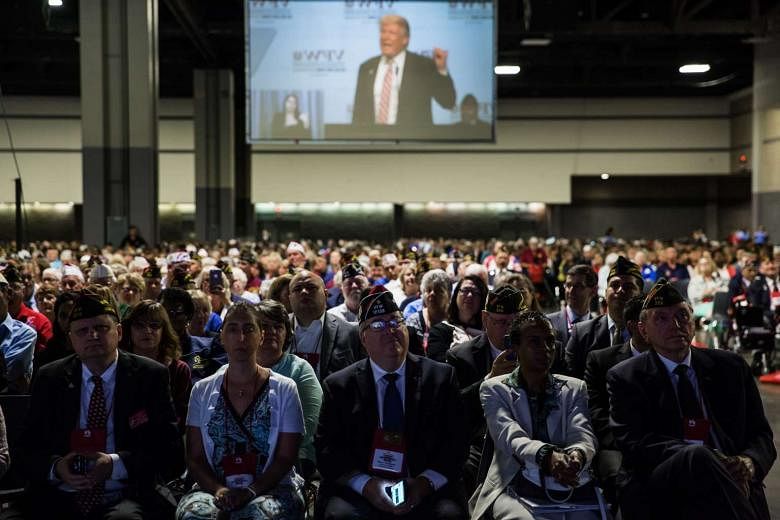Charlotte, North Carolina, is a thriving and increasingly cosmopolitan city. It is the second largest banking centre in the United States, with its airport the 23rd busiest in the world.
Charlotte is in the county of Mecklenburg, which is quite solidly Democrat territory.
But an hour's drive out, in Concord, it is a different story - one that mirrors an increasingly obvious rural-urban divide in several states of the Union including, for instance, Texas, Colorado and Nevada where cities are islands of blue (the colour of the Democrats) even in red (Republican) states.
In August this year a poll in the state of Virginia which neighbours Washington DC, showed the same trend.
This has been evident for some time, but more widely recognised after the 2008 presidential election. The trend solidified in the 2012 election in which 27 out of the US's 30 most populous cities voted Democratic. The Atlantic Monthly in an extensively researched article in November 2012 wrote "Some of America's bluest cities are located in its reddest states."
In June 2014, a Pew Research Centre study found that this polarity runs deep.
"Conservatives would rather live in large houses in small towns and rural areas - ideally among people of the same religious faith - while liberals opt for smaller houses and walkable communities in cities, preferably with a mix of different races and ethnicities," Pew said.
"And sizable minorities of both groups say they'd be dismayed if someone from the 'other side' were to marry into their family," it added.
"Three-quarters of consistent conservatives say they'd prefer to live in a community of larger houses with more space between them, even if that means having to drive to shops, restaurants and other amenities," Pew said.
"Consistent liberals were almost exactly the opposite: 77 per cent said they prefer denser communities where amenities were in walking distance, even if that meant living in smaller houses. (Speaking of amenities, 73 per cent of consistent liberals said being near art museums and theatres was important, versus just 23 per cent of consistent conservatives.)"
Nationwide, around half the vote in the current election will come from people in big cities. In many ways, analysts say, it is big cities versus the rest as post industrial rural areas feel left out and left behind. It is these areas where Donald Trump's straight and simple tough talk is resonating.
Writer Jason Pargin, who goes by the pseudonym David Wong, last month in the online Cracked.com wrote: "The cities are less than four per cent of the land mass, but 62 per cent of the population and easily 99 per cent of the popular culture. Our movies, shows, songs, and news all radiate out from those blue islands. And if you live in the red, that… sucks."
In the North Carolina case, since 1994 the state has lost more than 369,000 manufacturing jobs.
In a recent visit to a town called Faith, barely an hour's drive from Charlotte, Charlotte Observer journalist Tim Funk found people almost without exception ready to trust Mr Trump when the Republican candidate promised to get their jobs back.
Lenny Melton, 39, owner of a bicycle shop, told him "You ride through every mill town from here back to Charlotte - you'll see what we've lost. There's nothing here. Nothing. Unless you want to work at Walmart, Taco Bell, Kohl's, IHOP. There's no (other) place to work."
"There is a sense of betrayal in old manufacturing towns," Mr Funk told me when I visited the newspaper on Nov 3 with a small group of foreign journalists travelling with the East West Centre's Presidential Election Reporting Seminar.
Democrat candidate Hillary Clinton is neck and neck with Mr Trump in the swing state where both camps have been pulling out the stops this week. That afternoon in Concord, Mr Trump held a rally in a medium sized indoor stadium which was about 80 per cent full with some 2,000 cheering people.
Concord was once a textile town - before all the jobs left, mostly to Asia.
Mr Trump spoke as usual about scrapping the North American Free Trade Agreement (NAFTA), and a slew of other measures which he promised would bring the jobs back. He reeled off the layoff figures of local companies. The crowd listened - and when he promised jobs, they cheered.
It was a far cry from Charlotte, and it was also not devoid of irony. When the locals streamed out of the rock concert-like rally after Mr Trump left, the police sirens of his convoy fading into the vast countryside behind the stadium, a vendor was selling Trump baseball caps at the car park at US$ 20 (S$28) a piece.
They were made in China.

